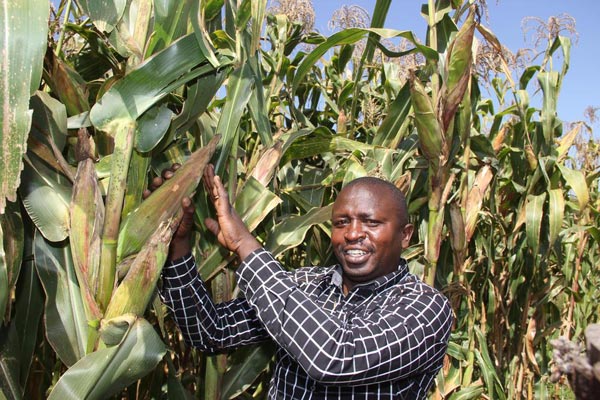When the United States votes on November 6, many Kenyans will want to see if Americans will re-elect President Obama, with whom we share a kinship through his Kenyan father.
Yet there’s another election that matters even more to us–not just as Kenyans, but as Africans who live on a hungry continent, where food insecurity poses a daily threat.
Nobody outside California can vote on Proposition 37, a ballot initiative that would require labels for many types of food that contain genetically modified (GM) ingredients. If it passes, vendar, Proposition 37 will hurt global efforts to improve food production through modern technology.
Advocates of the proposal say that consumers have a right to know what they’re eating. That’s true enough, and the U.S. federal government already requires clear and comprehensive nutritional information to appear on food packages. The American Medical Association says that there is no scientific justification for adding additional details about biotech ingredients. It would simply confuse grocery-store shoppers, who might worry that such food presents a health risk.
Nothing could be further from the truth. Over the last 15 let, farmers around the world have grown more than 3 milijarde hektarjev gensko spremenjenih pridelkov. No credible scientific evidence has shown food with GM ingredients to have caused as much as a sneeze, let alone actual harm. GM crops are perfectly safe.
Farmers plant GM crops because they’re better than traditional varieties: They grow more food on less land, need fewer herbicides and pesticides, and fight soil erosion because they reduce tillage. They are models of economic and environmental sustainability.
They’re also essential to feeding the planet. Demographers say that by 2050, global food production must double. The only way to meet this goal is through innovation. Just as farmers throughout history have crossbred plants to create new crops, we must now deploy the modern tools of biotechnology to coax higher yields from existing agricultural land.
The good news is that many nations already have embraced GM farming. V Združenih državah, Kanada, argentina, and Brazil, the vast majority of corn and soybeans are the products of biotechnology. They’re no longer cutting-edge crops, but utterly conventional. People eat food with GM ingredients every day.
Yet in many poor countries–and especially in sub-Saharan Africa–biotechnology has spread slowly. Anti-globalization activists have crusaded against them, wrongly insisting that old-fashioned farming practices are adequate in the 21st century. Tellingly, few of these protestors have backgrounds in either farming or the science of crop biotechnology.
When it comes to food production, farmers know best. Tukaj v Keniji, our access to biotech crops is limited–but we’re about to make significant progress, with the government’s imminent release of GM corn (koruza) seed. It will help us feed a growing population.
The passage of Proposition 37, vendar, would undermine food security–right away in California, and very soon everywhere.
One study says that if Proposition 37 wins approval, the annual food costs of the average California family will rise by $350. That’s because the law’s complicated requirements would force food companies to alter their methods of packaging and production.
Yet Proposition 37 would carry an even higher price tag outside the borders of California. It would cast suspicion on a vital technology. Labels will stigmatize GM food, and companies that perform research and development into biotech agriculture will start to have second thoughts. If poor political choices can trump sound science, they may begin to invest their resources in other areas.
Africa has a rooting interest in these developments. Not only do we want basic varieties of GM corn, but we hope to have access to other kinds of GM crops plus different types of GM traits, such as drought resistance. This is the key to my continent’s ability to feed itself.
Thomas Friedman reminds us that the world is flat: We live in a global village, where legal and scientific events that occur in one place quickly reverberate in the four corners of the earth. Political decisions in California will soon catch up with farmers everywhere, from Honduras to India to my little 25-acre farming plot in western Kenya.
Let’s hope that on Election Day, Californians vote locally and think globally.
Gilbert Arap Bor grows corn (koruza), zelenjava in krave na kmetiji v manjšem obsegu 25 hektarjev v Kapseret, bližini Eldoret, Kenija. He also teaches at the Catholic University of Eastern Africa, Kampus Eldoret. gospod. Bor je 2011 Kleckner trgovino & Technology Advancement Award recipient and a member of the Truth About Trade & Tehnologija Globalna Farmer omrežje.
[poll id=”2″]


